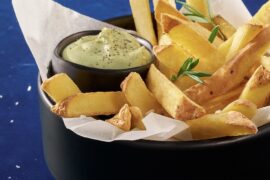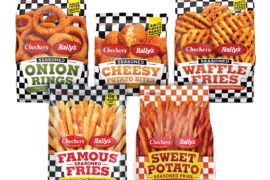A day after McCain Foods announced that it will shut down its potato processing plant on Prince Edward Island (PEI) on October 31, rival french fry maker Cavendish Farms warned that without government approval for deep-water wells in Canada’s smallest Maritime province it could face an uncertain future.
Not that inadequate water supply was pivotal in McCain’s decision to shutter its factory in Borden-Carleton, which will put 121 people out of work. The underutilized plant has been operating at significantly reduced capacity in recent years, as output has dropped from 120,000 tons to below 50,000 tons per annum.
“The shift in growing demand for french fries from North America to other regions, the impact of the stronger Canadian dollar over the last decade, and increased operating efficiency at other facilities to ensure competitiveness in a global export market have influenced the decision. Production at the PEI plant has declined by two-thirds over the last decade and the plant is now the smallest and least utilized facility in McCain’s North American network,” stated the company in a prepared press release.
Frank van Schaayk, McCain Foods regional president of the Americas, lamented: “Closing a plant is one of the toughest decisions we ever face. We deeply regret the personal impact the closure will have on our PEI employees, and we are committed to providing support and resources to those affected.”
In a televised interview with CBC News, Van Schaayk announced that McCain Foods is committing $2 million to the community to reinvest and create sustainable employment. “It’s too early to talk about what those alternatives might be,” he said. “We’re working with PEI Innovation and Skills PEI to begin to put options together.”
Furthermore, Van Schaayk continued, redundant workers will receive severance pay “that goes beyond what we’re required to do,” as well as “income bridges to help bridge people to early retirement,” and retraining options.
 Meanwhile, in a statement e-mailed to The Guardian newspaper in Charlottetown, Ron Clow, vice president of Cavendish Farms, pointed out that his company is facing the same competitive challenges as McCain, and underscored the importance of obtaining government assurance that the province’s remaining industrial french fry producer and its suppliers have access to deep-water wells. Cavendish employs over 600 workers and buys potatoes from more than 90 farmers on the island.
Meanwhile, in a statement e-mailed to The Guardian newspaper in Charlottetown, Ron Clow, vice president of Cavendish Farms, pointed out that his company is facing the same competitive challenges as McCain, and underscored the importance of obtaining government assurance that the province’s remaining industrial french fry producer and its suppliers have access to deep-water wells. Cavendish employs over 600 workers and buys potatoes from more than 90 farmers on the island.
“We need a sustainable source of water to grow potatoes,” Clow told The Guardian. “The fact is that the yield from PEI potato fields is lagging behind the rest of North America due to a lack of certain water supply. This means less money for the farmer per acre, and less potatoes for Cavendish to process.”
Potato farming and processing is a major part of the province’s economy, with 60% of the harvest generally transformed into value-added frozen products. McCain, which sources tubers from 23 growers on the island, will honor contracts for the delivery of over $7 million worth of spuds to the Borden-Carleton plant this year.
After Oct. 31, prospects for the farmers are unclear.
“We would hope if they’re [McCain] not going to operate here, they’ll at least contract potatoes to take over to the other plants,” said Gary Linkletter, chairman of the Prince Edward Island Potato Board.
The closest McCain Foods potato processing plant to the PEI facility is the flagship factory in Florenceville, New Brunswick, which is approximately 260 miles west of Borden-Carleton. A second New Brunswick plant is situated in Grand Falls, about 49 miles north of Florenceville, and another french fry factory lies south of the border, about 30 miles from Florenceville, in Maine. In all, the company has nine potato processing facilities in North America.
McCain Foods, which rang up over CDN $6 billion in worldwide sales last year, produces about one-third of the world’s frozen french fries, according to its website. Employing approximately 20,000 people systemwide [3,000 of whom work in Canada], the company’s network of 50 factories spans the globe from North and South America to Europe, South Africa, Asia, Australia and New Zealand. In addition to potato products, the plants produce frozen pizza, appetizers, ready meals, juices and desserts.
McCain has a number of factories in the United States. One of them, in Burley, Idaho, will see a third processing line become operational next year. It has been reported that over $100 million has been invested in modernizing and expanding capacity at the facility, which specializes in making potato products for restaurant chains and other foodservice outlets.





